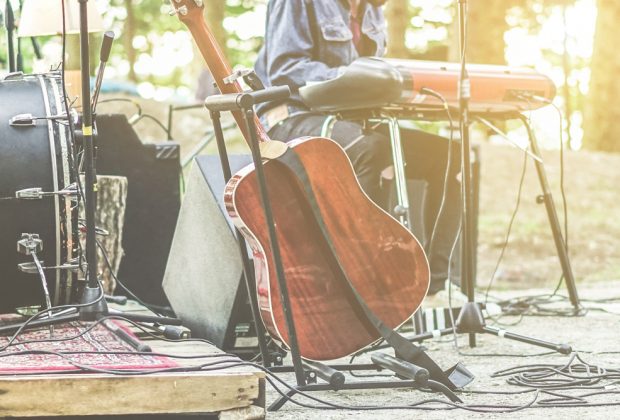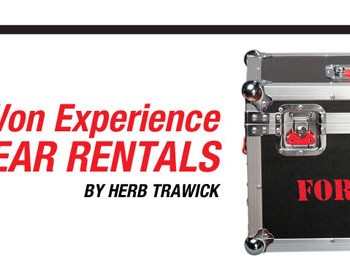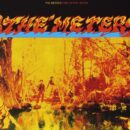As a touring musician, I find packing for the road to be an ongoing learning experience. You need clothes for travel days, meet-and-greets, and performances; documents and copies of documents; all of your essential gear; and just enough backup gear to be covered in case of inevitable emergencies. You may have to haul your own bags, so overpacking is not an option. Bottom line? Have items that can multi-task and expect the unexpected. Here are some things to remember as you prepare to hit the road:
1. Copy that!
Keep a copy of your passport and license at home with someone you trust. It also helps to have redundant copies in the cloud. “Lost or stolen” happens, and without proper I.D. you’ll have a hell of a time getting to your next destination. Domestically, you won’t get past T.S.A. checkpoints. If you’re abroad, you won’t be able to leave the country at all without your passport. Having a backup that can be emailed to you quickly can prove your citizenship, which is required to get a temporary passport from a U.S. embassy.
*Tip: Always be sure your passport and license are current. Be aware of your expiration dates and plan well in advance for renewal. Allow two months for the passport process, to be safe. If you don’t have a passport yet, just get one. Like, NOW. Before you need it. You don’t want to be that person who isn’t “good to go,” especially if you’re a hired gun.
**Bonus Tip: You should also have copies of your itinerary, flight numbers, hotel and venue names and addresses, and pertinent contacts.
2. Emergency Stash
Recently, on a fly-out from Los Angeles > Baltimore > Cincinnati, I was told all overheads were full and was forced to gate check my carry-on suitcase. It contained my drumstick bag, click and stage clothes. The connecting flight in Baltimore was canceled due to weather and the band’s only option was to drive to Cincinnati. My checked bag, however, never left Baltimore. So, at my destination I had only the clothes on my back, IEM’s and toiletries––no sticks or click. Fortunately, I was able to get some sticks from the backline company and I ran the click from an iPhone app. Playing the show in my travel clothes was of lesser concern, as A) this particular band isn’t heavily styled, and B) from behind the kit, I’m mostly only visible to the audience from the waist-up and was already wearing a passable black shirt.
The takeaway? Pack essentials for one day in a personal bag. Even if your only luggage is a carry-on, bring that extra personal bag as well. That way, if you’re forced to gate check your carry-on and it gets lost, you’ll have some essentials until you get your luggage back. Personal bag essentials: toiletries, IEM’s, a pair of socks and underwear. As a drummer, I now also keep a couple of pairs of sticks and a “stage shirt” in that bag, too.
3. The Breakaway Bag
This is mostly for longer tours: if you can, pack an extra smaller bag to use later as a breakaway. Touring situations vary greatly, but having an extra bag that you can use for a scaled down/essentials version of your luggage can come in handy when dragging your larger luggage everywhere is not a practical option.
For example: on a 2-week/4-city tour of Japan, I found myself spending one night in a capsule hotel. Personal storage was limited to a small locker in the commons area, on the floor that contained all of the capsules (aka, “bunks”). My large luggage was safely kept in the lobby, but having a small duffel bag for my overnight essentials made for easy storage in my locker. This bag also came in handy when our crew drove our gear and large luggage between cities, while the band members traveled by train. And, at the end of the tour, when I was fortunate enough to have to figure out how to bring all of the fan gifts back to the states, guess which bag saved the day?
4. Yes, I can!
Carry and stow your instrument on the plane? Yes, you can. And now it’s the law. Read all of this: transportation.gov/airconsumer/air-travel-musi cal-instruments
And to save you a click, here is the “final ruling” on the matter:
transportation.gov/sites/dot.gov/files/docs/Musical%20instruments_FR_final%20rule.pdf
Airlines will often tell you upon boarding that you have to check your instrument, and that it won’t fit in an overhead bin. Granted, a tuba probably won’t, but your average guitar, bass, or smaller instrument will. Be polite when letting them know the law, and you should be allowed to carry it on without incident.
Increase your odds by boarding as early as possible. At the very least, check in online 24 hours before your flight. It’ll give you a better boarding position, in which case there should still be plenty of available overhead space when you board.
*Tip: save the above link to your phone, in case they give you a hard time. You’ll be able to quickly bust out the “.gov” as proof.
5. A picture is worth a thousand words
Take photos of every piece of luggage and gear. Many suitcases look the same or similar, so even if your bags aren’t lost on the way, there’s the chance of someone grabbing your luggage by mistake. If your stuff goes missing, photos will be a big help in reclaiming it. They should clearly show the brand names of the luggage, the contents and, if possible, any serial numbers on packed gear.
The life of a traveling musician is awesome and exciting. So don’t trip, just enjoy the journey! A little common sense and preparation can ensure that every tour and fly-out goes great. Safe travels!
STEPHEN MILLS is a Los Angeles-based drummer who tours nationally and internationally with artists including Jack Russell’s Great White, Gene Loves Jezebel, Mark Mackay, Bulletboys, Haim and his original band, Alley Cats LV. Follow his activities on Instagram @stephenjude.












